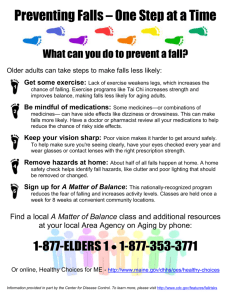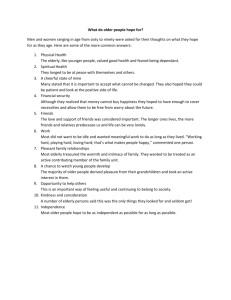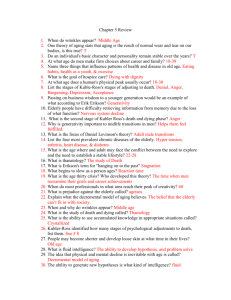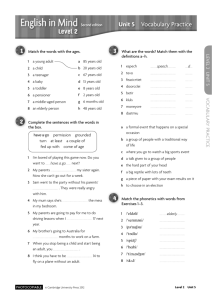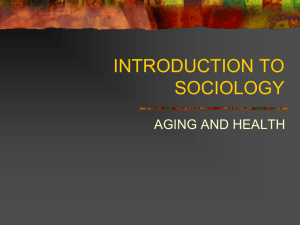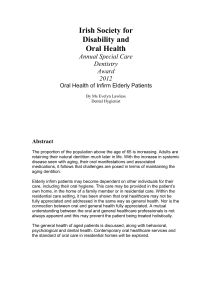Traditional Societies and Traditional Medicines
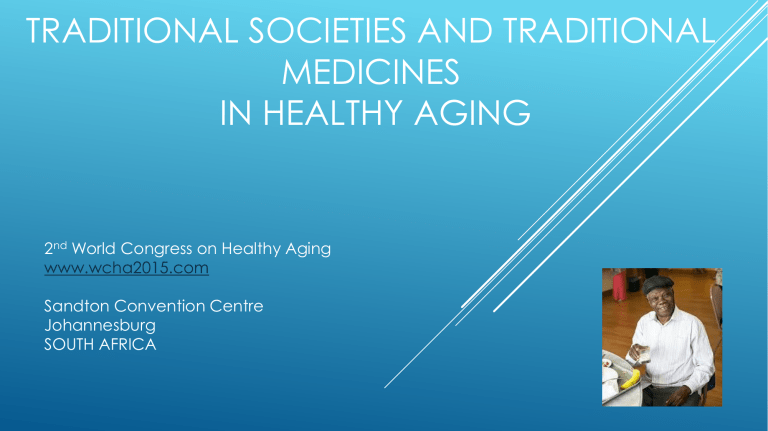
TRADITIONAL SOCIETIES AND TRADITIONAL
MEDICINES
IN HEALTHY AGING
2 nd World Congress on Healthy Aging www.wcha2015.com
Sandton Convention Centre
Johannesburg
SOUTH AFRICA
DR MOTLALEPULA G MATSABISA
IKS RESEARCH PROGRAMME
DEPARTMENT OF PHARMACOLOGY
FACULTY OF HEALTH SCIENCE
UNIVERSITY OF FREE STATE
Sunday August 2 nd , 2015
Genetics
Biochemical Cell biology
Haematological
Ageing
Endocrinology
Ageing-related disease cardiovascular disease, Alzheimer’s, cancer, diabetes, etc.
Physiological
Immunological
OLD AGE
…………………..generally begins at age of 60
People in this age group are called SENIOR CITIZENS
BUT People may be considered old when
…………………. They become grand parents
…………………..They begin to do less work due to ill-health
…………………..They become professionally inactive after retirement
THREE MAIN CHARACTERISTICS OF
ELDERLY
Physical characteristics
Cognitive Characteristics
Social Characteristics
- PHYSICAL CHARACTERISTICS -
They
Have Visual and Hearing Problems
lose Smell and Taste
are Susceptibility to illness
Heart Disease
Leading Causes of Death
Pneumonia
Diabetes Hypertension Cancer
- COGNITIVE CHARACTERISTICS -
Experience decline in mental processes
May experience memory lapses
May experience disorientation problems
- Alzheimer’s disease - progressive irreversible brain disorder that is characterized by gradual deterioration of memory, reasoning, language and physical functioning
- There is currently no satisfactory cure and its cause is still speculative It is thought that mental activity, exercise and nutrition improves the condition
Alzheimer’s disease is a sad disease - Elderly can’t remember the people and places in their lived
- SOCIAL CHARACTERISTICS -
Because of declining health & limited mobility
*Most tend to have tendency to withdraw from society
*Tend to want to be on their own and think about the past
ISSUES FACED BY THE ELDERLY
* Abuse
- Can happen in family
- Can happen in nursing homes / Old age homes
- Can be physical or psychological
* Loneliness
- Death of partner or support
- Children gone their way
* Poverty
-Loss of earning
-May receive retirement / grant but not enough
* Health
* Discrimination
-Job
-Social
-Medical
5 Main Types of Elderly
Abuse
Physical
Psychological
Financial
Sexual
Neglect
WHAT IS OLD AGE CARE
Any positive interventions to strengthen Community, family & Social
Support Systems
Components include
Medical care (Modern or Traditional)
Social care
Security
Now therefore - can Cultural / Traditional
Systems Play a role ?
What is Culture
---- is an integrated pattern of human behaviour which is generally accepted as a norm in a given
Community or Society
This pattern of human behaviour may include
• Practices
• Beliefs
• Expected behaviours
• Thinking
• Communications
• Dressing
• Roles
• Relationships
• Rituals
• Customs
• Respect & how to address people*
These patterns are specific to a race, ethnic grouping, religious, Social, political, professional group
Culture is …..
Applicable to all peoples
Multi-layered
Malleable / changes over time
Viewed as thick, thin or compartmentalized
Always considered within a context
Culture
Structures perceptions
Shapes behaviours
Is total way of life – it tells group members how to behave and provides their identity and support
What do we do with them
- They are old
Cultural Beliefs about age (Traditional Communities)
Old people in most traditional societies are typically accorded social respect and honour, as well as significant degree of power and control within their societies. This view of elders in traditional societies is true for both women and men. They are further regarded to become ancestors in their future lives. Their continued presence within the family household are said to bring luck in the family than being a burden
Cultural Beliefs about Age – Industrialized /
Modern Society
In industrialized societies, old age is not generally a revered status and elders may not always be honoured within their families or among their friend and other associates , as well as in society at large. This is more often the case of female elders
CULTURAL BELIEFS ABOUT AGING: THE VIEWS
Modern Society view elderly as:
• Incompetent & obsolete
• Society develops labels for them: Useless, ineffective, helpless
• Society then provides inadequate support services,
Social interactions and fund
• Elderly’s skills deteriorate
• Elderly then labels themselves incompetent
Traditional Society view elderly as:
• Competent and important
• Society develops positive labels for them Helpers, Advisors, Self controlled, Wise and competent
• Society provides support systems for them: Family support, adequate housing,
Health services, economics,
Nutrition and social services
• Elderly’s skills improve and are trusted
• Elderly labels themselves as competent, needed and useful
OLD AGE HOMES - WHY GENERALLY SAID NOT
ACCEPTABLE IN TRADITIONAL CULTURES
Honour thy father and thy mother
Elderly feel abandoned
There may be physical and psychological abuse
The place is foreign
Could be language issues
Confined to the place
May be sharing a place and bedroom with stranger
They are seen as income for homes
Not adequate care
SOCIETY AND ROLE IN AGING
Urban vs. rural
Nutrition - caloric restriction Mediterranean & Okinawa Diets
Stress
Life style
Genetics
Disease
Meditation
Tradition medicine
TRADITIONAL VS. URBAN SETTINGS
Elder sister : Born 1933
Lives in rural area, widowed
Stays with 2 great grand children
Has many community friends and is respected in the community
Has cattle, sheep, goats, Pigs and chicken and agricultural fields
Electricity & borehole water
Lives in a traditional ways & eats meat once in a while (lives on mostly wild vegetables and grains, eggs and believes in herbal products
Health status: Very active, healthy Never been sick Very sharp mentally, good eyes, No diabetes
Younger sister : Born 1935
Lives in the city, widowed
Stays with 1 great grand child and stays in a shack
No animals
Electricity & Running water
Lives a city life with pension
Eats modern processed food
Health Status: sickly, has involuntary shaking and cannot do things on her own
HEALTH CONCERNS WITH AGING
Traditional care/support for the elderly: The main cause of fear for aging is lack of care, loss of function (bodily/work), and being ignored, etc...
- Prevention of rate of aging: anti-aging medicines, physical activity, and mental exercise....
- Promotion of healthy aging: support for common failing systems, e.g., nutritional, immune, antioxidants, etc.
Prevention and Treatment of disease/disorders of age: mention traditional remedies for depression, osteoporosis, movement disorders, CVS disease, etc.
EFFECTS OF TRADITIONAL MEDICINES & HEALTHY
AGING
Antioxidant
Anticancer
Cardiovascular
Immune Effects
Acetyl cholinesterase / Butyryl cholinesterase inhibitors
SELECTED TRADITIONAL MEDICINES
Clitoria ternatea & Acorus calamanus _ acetyl cholinesterase inhibitors (India)
Studies on Local Plants Terminalia and some Combretum spp.
Have shown anti-Oxidant, anticancer and inhibitors of Acetyl and Butyryl cholinesterase
Many Indigenous South African teas come from the Lippia genus of plants – This genus has been shown to be rich in antioxidants and have some nutritional contents
Healthy Aging and Cultural Perceptions
Across cultural groups, a healthy good old age is characterized by four factors
• Physical health and activity
• Material Security
• Sociality
CONCLUSION
Rowe, 2000 concluded that successful aging has three main components
1. Low probability of disease and disease related disability
2.
3.
High capacity for cognitive and physical functioning and an active engagement with life including interpersonal relations and productive activity
Traditional systems contributes to giving the elderly respect and the attention they need. They see the elderly as respected members of community
Traditional Medicines are complex mixture of chemical components with diverse biological and pharmacological actions
A number of traditional medicines have been used which scientifically demonstrated their anti aging properties
According to traditional theories These herbs can help maintain levels of vital energy in our body
CONCLUSION
Some traditional medicines have now been shown to have multiple neuro-protective mechanism that enable them to be used in different health stages for disease prevention and even curing
Traditional Medicines have been shown to be effective in treating Psychiatric and mental conditions
Many plants have been shown to have anti-oxidant properties and immune stimulating properties, which are key in reversing some of the aging processes
THANK YOU
Healing Plants
Nature ’ s Gift for
Everyone
International Symposium on
Methods for Studying Drug
Metabolism and Transport and
African Traditional Medicines www.methods2015.org
22 – 25 November 2015
Pretoria
